THE MABATI-CORNELL KISWAHILI PRIZE FOR AFRICAN LITERATURE
Announcement of 2019 winners
The winners of the Mabati Cornell Kiswahili Prize for African Literature 2019 were announced by the Chairman of the Board of Trustees, Abdilatif Abdalla, together with the the Safal Group CEO, Mr. Anders Lindgren during a special ceremony at the Intercontinental Hotel, Nairobi on Thursday 27 February 2020. The guests of honor included Ms Josephta Mukobe, Permanent Secretary Ministry of Culture and Heritage and Hon. Safina Kwekwe, Permanent Secretary Ministry of Tourism.
The prize was founded in 2014 by Dr. Lizzy Attree and Dr. Mukoma Wa Ngugi (Cornell University) and has the express goal of recognizing writing in African languages and encouraging translation from, between and into African languages.
The judges; Prof. Clara Momanyi, Dkt. Amiri Swaleh and Bwana Ahmed Rajab, selected Lello Mmassy’s novel – Mimi na Rais (The President and I) as the winner in the fiction category while Mohamed Songoro’s poetry manuscript – Nusu ya Moyo (Half of a Heart) was selected as the winning entry in the poetry category. They both receive prize money of $5,000 US.
Speaking on behalf of the judges, the chair, Prof Clara Momanyi said that Lello Mmassy’s novel Mimi na Rais (The President and I) won first place because “it is a modern novel that looks into the current political reality in many African countries, but with a distinct approach because the writer uses the tools of modern technology to increase readability.” She added that, “The writer shows where the Kiswahili novel is headed; to the highest standards of literature.”
Regarding Moh’d Khamisi Songoro’s poetry manuscript, Nusu ya Moyo (Half of a Heart), the judges said that, “the manuscript employs very captivating language through the use of sarcasm and engaging language that is distinct and of the highest professionalism. Besides, the poet teaches the meaning of words and thus contributes to the development of Swahili. The poet’s composition is of the highest quality and is written with great skill.”
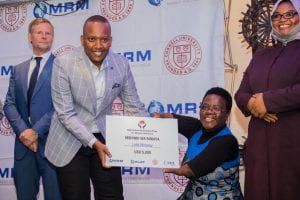
Lello Mmassy, from Tanzania, is an Economist by profession. He holds a bachelor’s degree in Economics of Development and works with one of the biggest Breweries in East Africa. His passion for writing fiction dates back to 2001. Since then, he has written different fiction stories as well as analytical articles on Economics, Politics and Development in newspapers and magazines. Mimi Na Rais (The President and I) is his first work to be published, even though he has other stories online. He is married with one little daughter.
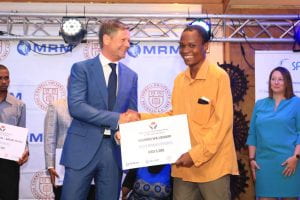
Moh’d Khamisi Songoro, born in 1993, is a writer and poet who grew up in Zanzibar. His pen name is Mfalme. He is studying towards his bachelor’s degree in Literature and Education with a focus on languages at the State University of Zanzibar. He started writing poetry at the age of 14, where he participated in composing poems for school purposes under the close guide of his teacher. Songoro started professional writing in 2015 and a number of his poems have been broadcast on several radio stations on the island of Zanzibar.
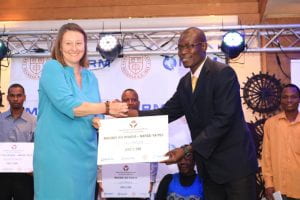
The second place winner in the fiction category was Kenya’s John Wanyonyi, whose novel Safari ya Matumaini (A Journey of Hope), was awarded $ 2,500 US. The judges called it “a special work that tackles topics that many works of Kiswahili literature fail to engage, that is, spotlighting the male child; his experiences and his place in today’s society at large.” The judges also noted that the novel is written in an interesting style which adopts simplicity to make it accessible to the reader.
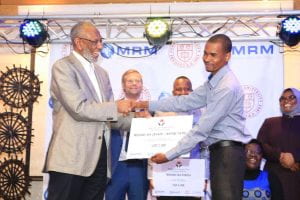
The second place in the poetry category, which was also awarded $2,500 US, was Mji wa Kambare (The Township of Kambare), by Rashid Othman Ali. Ali was born in Pemba, Zanzibar. The judges commented on Ali’s poetry for its “mix of content with various composition elements that are very relevant to real life today.” And for its “careful selection of words and language which makes his poetry manuscript attractive and enjoyable for the reader, making them want to come back and read again. Ali’s poetry excites, entertains, inspires and teaches and this is another example of how Swahili poetry continues to grow and inspire current generations.”
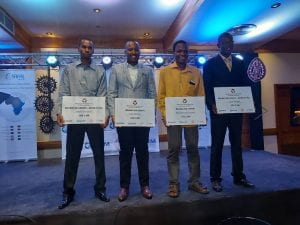
As earlier announced, Theuri Maina from Kenya was shortlisted for his novel, Ziaka Imetoboka and Nassor Hilal Kharusi from Zanzibar was shortlisted for his poetry manuscript named Mama Usihuzunike. Both Theuri Maina and Nassor Hilal Kharusi were in attendance at the awards ceremony.
Notes to Editors
The Prize is primarily supported by Mabati Rolling Mills of Kenya (a subsidiary of the Safal Group), The Office of the Vice Provost for International Affairs at Cornell University, the Africana Studies Center at Cornell University and the Ngugi wa Thiong’o Foundation.
Safal Investments Mauritius Ltd. and its subsidiaries (which include Mabati Rolling Mills Ltd of Kenya and ALAF Limited in Tanzania) are collectively known as The Safal Group. The Safal Group is the largest producer of Steel Roofing on the African continent with 36 operations in 12 countries. www.safalgroup.com
Mabati Rolling Mills Ltd (MRM) is the largest producer of steel roofing in Kenya. Established more than 50 years ago, the company is a leading innovator in its field. MRM led Africa in the manufacture of coated steel using the most advanced corrosion protection technology available worldwide, and its roofing brands are household names which are known and trusted by millions of consumers. www.mabati.com
The Safal MRM Foundation, based in Kenya, is a philanthropic enterprise of Mabati Rolling Mills and the Safal Group. It founded, and continues to fully manage, both the Mabati Technical Training Institute, and the Mabati Medical Centre, both in Mariakani, Kenya. safalmrmfoundation.org
ALAF Limited (ALAF) is Tanzania’s leading steel roofing manufacturer. Established in 1960, ALAF has always, and continues to be, a key player in the development of the country’s construction sector. ALAF is a fully integrated operation, not only making steel roofing, but also producing the metal coated coils used by these roofing operations. ALAF manufactures metal tubing and piping for various applications. alaf.co.tz
The Africana Studies and Research Center enriches the academic, cultural, and social environments on the Cornell University Ithaca campus. Website: http://www.asrc.cornell.edu
Mkuki na Nyota Publishers is an independent, vibrant Tanzanian imprint publishing relevant, progressive, liberating, affordable and entertaining content. Established in 1991, Mkuki na Nyota Publishers emerged in response to the general absence of high quality, independent publishing in Tanzania. Its mission statement is to publish, “Relevant Books, Affordable Books, and Beautiful Books.” They have successfully published 2017 poetry winner Dotto
Rangimoto’s Mwanangu Rudi Nyumbani (December 2018) and published Ali Hilal Ali’s novel Mmeza Fupa (January 2019). http://www.mkukinanyota.com
East African Educational Publishers is one of Africa’s leading publishers. EAEP strives to juggle the seemingly contradicting values of publishing works of enduring value cutting across the social, cultural, political and economic spectrum of society and at the same time excelling as a viable business that is ready to face the realities and vagaries of the technology age. They published 2015 winners A.S. Manyanza and Enock Maregesi’s novels Penzi la Damu and Kolonia Santita in 2016. http://www.eastafricanpublishers.com
The Africa Poetry Fund promotes and advances the development and publication of the poetic arts through its book series, contests, workshops, and seminars and through its collaborations with publishers, festivals, booking agents, colleges, universities, conferences and all other entities that share an interest in the poetic arts of Africa. Website: http://africanpoetrybf.unl.edu/
Ngugi Wa Thiong’o Foundation is powered by the interest and passion to raise the visibility of African Languages in Kenya, Africa and the world, as vehicles for performance, creativity, innovations, and scholarship. It sees African languages as the new intellectual frontier in everything from culture, biological sciences, technology and medicine. http://ngugiwathiongofoundation.org
Board of Trustees: Abdilatif Abdalla (Chair), Mukoma wa Ngugi, Lizzy Attree, Happiness Bulugu, Walter Bgoya, Henry Chakava, Chege Githiora, Abdulrazak Gurnah, Carole Boyce Davies, Rajeev Shah, and Ngugi Wa Thiong’o.
Administrator: Moses Kilolo.
Judges 2019
Prof. Clara Momanyi is a Kenyan who has been teaching Kiswahili Literature in Kenyan universities for more than 20 years. Her Master’s dissertation was on Kiswahili Literature and Gender Issues. She is also a novelist, and writes short stories and poetry. Her book, Ushindi wa Nakate (Nakate’s Victory), won the 2015 Jomo Kenyatta-Textbook Centre Prize for Literature, in the category of Children’s Literature. Her other books include Tumaini and Pendo Katiia Shari. Her academic papers have been published in various recognized journals. She currently concentrates on research in Kiswahili Literature as well as translating national and international documents into Kiswahili from English.
In 2015 Prof. Momanyi was one of the judges of the inaugural edition of the Mabati-Cornell Kiswahili Prize for African Literature. She has also adjudicated in other Literature Prizes, such as the Jomo Kenyatta Prize for Literature, Kenya, both in Kiswahili and English.
Ahmed Rajab is a Zanzibari-born international journalist, political analyst, essayist and a columnist for Tanzania’s premier weekly Raia Mwema. A philosophy graduate (University of London), he also holds a post-graduate diploma in Urbanisation in Developing Countries (University College, London), and a Master’s degree in Modern African Literature (Sussex University). His dissertation was on the Négritude poet David Diop.
Ahmed has worked for the BBC World Service, Index-on-Censorship (he was its first Africa and Middle East researcher-cum-editor), Africa Events, Africa Analysis, as well as Unesco and the UNDP. From 2006-2009 he was based in Dubai where he was Head of Newsroom (Middle East/Asia Bureau) for IRIN, the then UN humanitarian news agency and he later spent another three years in Nairobi as Managing Director of Universal TV. He now works as a consultant and is affiliated to the Kaduna-based Gusau Institute. Ahmed’s poems are included in the anthology African New Voices (Longman, 1997). He has translated into Swahili two children books which were recently published by Salaam Publishing in London. Ahmed Rajab was one of the judges for the 2018 Caine Prize for African Writing.
Dr. Amiri Swaleh is a Senior Lecturer in the Kiswahili Department, University of Nairobi. He has been teaching Kiswahili Literature and Socio-Linguistics for the last 27 years and is currently the Head of Kiswahili Literature. Besides his academic papers published in various journals, he is also a writer of short stories, which have been included in collections such as Kosa la Nani? na Hadithi Nyingine (2018). His main interests include research and criticism of Kiswahili Literature, especially in areas of gender, old Kiswahili Poetry, history of Kiswahili, language and the development of society, and political systems.